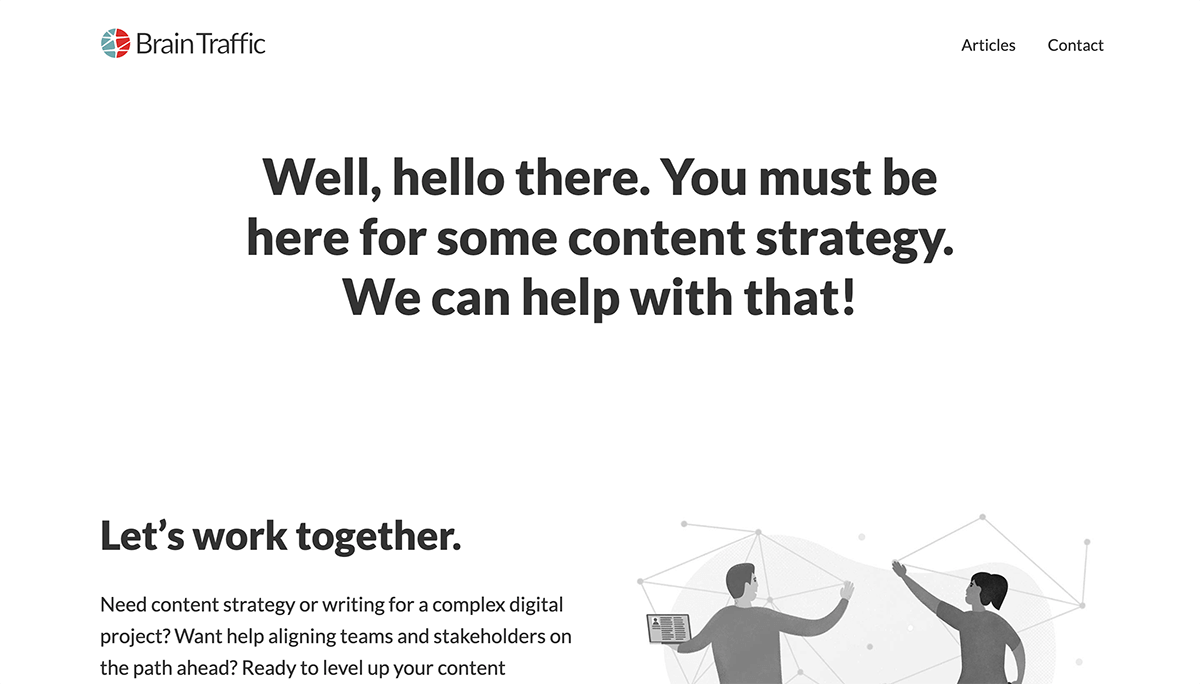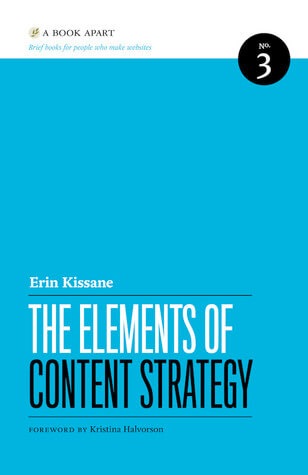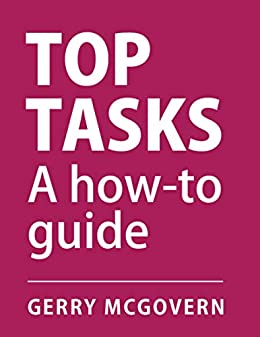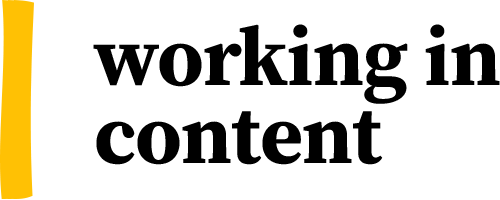On this page:
- Career history, at-a-glance
- Kristina's early career
- Writing Content Strategy for the Web
- The content strategy discipline gathers pace and popularity
- How Brain Traffic helps clients
- The future direction of Brain Traffic
- Advice, recommendations and tips from Kristina
- Kristina Halvorson: Further reading, watching and listening
Kristina Halvorson is the founder and CEO of Brain Traffic (a content strategy consultancy), Producer of both the Button and Confab conferences, author of Content Strategy for the Web, and host of The Content Strategy Podcast.
She’s completed work for the likes of Google, Adobe, Pearson and IDEO, and has also appeared as a featured speaker at conferences worldwide since 2008.

Career history, at-a-glance:
![Brain Traffic logo]() Brain TrafficFounder and CEO2000 - present
Brain TrafficFounder and CEO2000 - present![Button Conference logo]() Button ConferenceProducer2020 - present
Button ConferenceProducer2020 - present![Confab Conference logo]() Confab ConferenceProducer2011 - present
Confab ConferenceProducer2011 - present
We were excited to catch up with Kristina as she is one of the most well-known and respected industry figures within the world of content strategy. We spoke to her about her career to-date, where she gives an honest account of what it was like to build Brain Traffic, write a book, and be in charge of organising two conferences every year!
As always, we’ve also gleaned some great insight here, so whether you’re a budding content strategist new to the field, or a more seasoned player, we’re bound to have something useful for you in this article…
Kristina’s early career
Kristina left her last full-time employed job in 1999. Openly admitting that she’d describe herself as ‘a terrible employee’, she remembers the time of her transitioning from ‘employee’ to self-employed consultant well.
“I had helped to build my former employer’s company website. I was doing information architecture and website writing before I really understood what those things were.
“But I became really bored. I was just excited at the prospect of learning more and going deeper. I knew a little bit about a lot of things by that point, so I switched to being a consultant; doing PR and marketing for two small company clients."
Kristina loved the new freedoms and choices that being her own boss brought; working the hours she wanted to, and generally being in charge of her professional destiny.
“I'm the kind of person who wants to run the show. I’ve always been like that. Then September 11th happened. On September 12th, I lost both of my contracts. Both clients cut me loose because they knew the economy was about to crash.
“The US was in a tailspin from the 9/11 tragedy, and I knew it would be a while until I secured new consulting contracts. So I thought ‘if I have to market myself as a freelancer, what is the one thing that I feel the most skilled and confident about?’ and it was writing.”
Kristina began selling herself as a freelance copywriter and, very quickly, writing for websites became her niche. She soon named her business ‘Brain Traffic’ (because she thought ‘www.kristinahalvorson.com’ was just too long for people to accurately spell), and got some business cards printed with ‘Interactive Content Strategist’ as her official job title.

“I decided to call myself a content strategist before I knew it was an actual ‘thing’. I thought I made it up, but I didn't! It came from me knowing that I was doing much more than just showing up and ’getting some writing done’ for clients.”
There is no other company that even compares to Brain Traffic when it comes to content strategy and just good old fashion "brain power". Kristina and her team have the unique ability to cut through all the muck and come up with creative solutions fast. Their main job is to help you do your job better which is why Brain traffic is always on the top of my list.
source: LinkedInIn 2007, Kristina read an article by Rachel Lovinger called Content Strategy: The Philosophy of Data, and this made her realise that what she had been calling herself for years and indeed, the discipline of content strategy was a real thing.
What is content strategy?
Content strategy guides planning for the creation, delivery, and governance of useful, usable content.
source: Kristina Halvorson“So, I had books by Gerry McGovern and Ginny Reddish, which really informed the work I was doing. I also had Ann Rockley’s book ‘Enterprise Content Strategy’ - but that was more on the content management side, which wasn’t my thing.
“Rachel’s article was really focused on content strategy-based in user experience (UX), and I felt it was the best articulation of my work to date. I felt really excited when I read that article.”
Writing Content Strategy for the Web
In 2009, Kristina published her book ‘Content Strategy for the Web’; a publication that would soon become essential reading for content strategists around the world!
 Content Strategy for the Web
Content Strategy for the WebBETTER CONTENT MEANS BETTER BUSINESS. Your content is a mess: the website redesigns didn’t help, and the new CMS just made things worse. Or, maybe your content is full of potential: you know new revenue and cost-savings opportunities exist, but you’re not sure where to start. How can you realize the value of content while planning for its long-term success?
In the space of a few chapters, Kristina Halvorson's little book changed our field forever for the better.
— Jeffrey Zeldman, author, Designing With Web StandardsThis book is the most important thing to happen to user experience design in years.
— Peter Morville, author, Information Architecture for the World Wide Web and Ambient FindabilityContent Strategy for the Web gives you the tools you need to get the right content to the right people in the right place at the right time. Essential reading for marketers everywhere.
— Ann Handley, CMO, MarketingProfs.com and author, Content RulesShe decided to write the book after the positive responses she received to her (preceding) article ‘The Discipline of Content Strategy’ for A List Apart in 2008. She had known that the timing was good, and that this article was going to be an important one.
“I don't say ‘it was going to be important’ with any amount of ego; I just knew that I was ‘crystallizing’ a lot of the conversations I’d been having in the article.
“I had been seeking out other content strategists at the time, like Karen McGrane, Margot Bloomstein and Colleen Jones. I connected with Ann Rockley and Melissa Rach. Christopher Collette was in there too. Basically, everybody who attended the Content Strategy Consortium in early 2009 (which Karen and I co-organised) - which was a really, really pivotal event in terms of the actual ‘formalization’ of the field.”
Kristina felt really certain about how she’d cover the book’s subject matter and how she’d market it, but also, more generally, that there was a real ‘gap in the market’ for a publication of this kind. However, when she reflects on the experience now, she thinks that perhaps she wasn’t experienced enough to write the book all by herself at that time.
“I remember calling Melissa Rach in a panic, and she stepped in as a technical editor - well, she is credited as the book’s ‘technical author’, but really she was more of a ‘co-author’ of Content Strategy for the Web.
“When we did the second book, I was like ‘I’m not doing this without your name on the front cover’. Melissa really helped to contribute around the areas on information architecture and some of the testing content.
“I felt very confident that we were spreading the ‘good word’ about content strategy.”
Kristina’s life at the time was a balancing act of looking after two young children, working full-time and writing her book. She was also going through divorce proceedings. Luckily though, her husband at the time (John) was very supportive of what she was working on and he looked after their children most of the time, allowing Kristina the space she needed.
“It was a very delicate balance. I'm lucky that he's been a really great co-parent. That role that he played and that dynamic within our family was critical at that time.
“I ended up hiring Melissa in 2009, plus one other person to help with the business management side of things. Melissa would build the consultancy - focusing on craft and client delivery—and I was to go out and ‘bang the big drums’ for content strategy as a legitimate practice. I could not have done it without these people, and the people since who have helped run Brain Traffic.”
And for Kristina, it wasn’t just about building her new business. It was also about bringing the field of content strategy to life in the industry, and helping to establish it as a recognised discipline.
From my perspective, Kristina is the leading content strategist in the United States. Yes, she speaks and publishes widely on the subject, but so do her colleagues. Yes, she is passionate about its vital role in user experience design; many others agree. No. What sets Kristina apart is she remains (to my knowledge) the only practitioner to establish and build an entire (dozen-plus) professional services organization predicated around the emerging practice of content strategy, confidently positioning CS at the heart of what they do at Brain Traffic. To that end, she's a singular talent in the industry.
source: LinkedInThe content strategy discipline gathers pace and popularity
What she in fact managed to do is popularize content strategy, giving people ‘a way in’ and a book which people could read cover-to-cover and fully understand what content strategy truly meant.
“I simply gave an easy way to talk about what can be a very complex, intimidating topic. When I threw out the idea that content strategy was the what guided planning for the “creation, delivery, and governance of useful, usable content”, I figured that was as good of an elevator pitch as I was going to get.you say ‘here's the defacto definition of content strategy’, which was sort of all-encompassing and straightforward enough for people to get it - right away. And that hadn't existed before.”
A natural next step was to develop and run an annual conference, aimed at content strategists around the world. Kristina felt that she had met so many incredible peers and was excited by the idea of all of these like-minded professionals coming together to really indulge in all-things content strategy. The Confab conference was born in 2011 and has been running annually ever since.
“I remember asking Twitter, ‘what should we call it?’ And this guy named Aaron in Seattle, came up with ‘Confab’, and it was like, ‘great, let's call it Confab!’
“And then it was like ‘hey, everybody, we're doing a conference in May.’ Ok.. but how do you do a conference? I mean, it was like that. I turned to my staff and I was like, ‘now, what do we do next?!’”
Kristina eventually hired Erik Westra, who, in her words, became ‘Captain Confab’ for several years after.
“It’s a role that is now being beautifully played by Tenessa Gemelke, and Lauren Kramer still consults for us 10 years on.
“It was a bit of a scramble at the time though, and I don't know how we pulled it off(!), but it was an extraordinary event. We just had the best time.”
How Brain Traffic helps clients
Kristina takes a great deal of pride in the work that’s been delivered for clients over the years. Her team now consists of four full-time employees and a bunch of contractors; such has been the need to stay agile since the recent global pandemic emerged.
In general, there are three kinds of general outcomes that she will see in the work Brain Traffic does for organizations.
“The first outcome is that we help ‘to make a thing’, maybe reorganise a website or rewrite the content. Then the outcome is simply, look at what an amazing ‘thing’ that is. We are so proud of ‘the thing.’
“The second outcome is, ‘we've helped you see things differently for the first time. We've seen some light bulbs go off and created the beginning of a potential ‘shift’. I will also say that a lot of those companies, we end up revisiting over and over and over again, to sort of fire up the same light bulb over and over—that can be frustrating, because it’s like having the same conversation repeatedly. Those are mostly the older, larger organizations we work with.
“Finally, there are the projects where the organization is really ready for us to come in to tackle the most difficult part of content strategy: shifting culture.
“We’re able to spark significant change within the organization; how they see content, care for it, how they staff for it. And those are the engagements that really gets me out of bed in the morning.”
The future direction of Brain Traffic
It’s important to note that the general spirit behind Brain Traffic hasn’t been about numbers or the bank balance. Kristina has largely made choices about how to grow the company based on her own life priorities: her strong commitment to family, her desire to contribute to her local and global community, and her passion for creating new connections between people and ideas.
What has become clear to her (and her colleagues at Brain Traffic) more recently is that, across the consulting work, the conferences and the talks she gives at events around the world, there’s been a consistent desire to refocus and reprioritize on certain new initiatives.
These include helping to ‘lift up’ the voices of people who are new to the industry; supporting more collaboration amongst populations who are marginalised, and facilitating more diverse members of the content community in content strategy conversations.
“It is at the centre of everything that we do. So, when we look at the future of Brain Traffic, we’ve got endless opportunities to make all of that happen.
“We’ve talked about building new products and connecting the right candidates with the right companies - and we’re always thinking ‘does it fit with that lens? These values and aspirations?’ To that end, we’d love to also create more ‘new level’ events, when we’re next able to.
“We’ve also talked about doing some form of online education in the future - to help people develop and rise up in their careers.
“And, as well as all of these things, there’s also working with clients to help lift up the idea and ideals of content strategy there too.”
Kristina provides large agency quality and solid process, while remaining flexible and responsive to client needs in highly fluid environments. Her content strategies and copy deliverables are second to none.
source: LinkedInAdvice, recommendations and tips from Kristina
If you could go back in time and give yourself a piece of personal advice early in your career, what would that be?
“Write more, probably. That is a thing that I have not been disciplined about over the past decade. I have prioritised time with my kids, time with my friends, travelling and speaking over writing. I do wish I had carved out more time to write another book, for example.
“I know though that I've got years and years ahead of me, with hopefully more space and time to write. So, my advice to myself would have been to better develop my own writing practice.”
Which industry professionals should people be following right now on Twitter?
 Crystal Yan New financial products @PassbookRemitly, teach design @MICA, coach leaders. Fmr @USDSFollow @crystalcy
Crystal Yan New financial products @PassbookRemitly, teach design @MICA, coach leaders. Fmr @USDSFollow @crystalcy Candi Williams Content Design Lead @Bumble by day. Author by night. Fan of clear words, inclusive design, bold stationery, yoga, food and wine. #BlackLivesStillMatterFollow @candiwrites
Candi Williams Content Design Lead @Bumble by day. Author by night. Fan of clear words, inclusive design, bold stationery, yoga, food and wine. #BlackLivesStillMatterFollow @candiwrites Malaika Carpenter Writer. Content Strategist. Speaker. Comedic performer. Changing the world one sentence, line & word at a time through clever wordplay & storytelling.Follow @MalaikaInk
Malaika Carpenter Writer. Content Strategist. Speaker. Comedic performer. Changing the world one sentence, line & word at a time through clever wordplay & storytelling.Follow @MalaikaInk John Paz Writer, designer, family man, sports fanatic (thoughts are my own) #BlackInTech #LatinxInTech #TechWriting #ContentDesign #UCF #OrlandoCity #StLCards #DolphinsFollow @SrContentDesign
John Paz Writer, designer, family man, sports fanatic (thoughts are my own) #BlackInTech #LatinxInTech #TechWriting #ContentDesign #UCF #OrlandoCity #StLCards #DolphinsFollow @SrContentDesignWhich books would you recommend to someone who’s early in their content career?
 The Elements of Content Strategy
The Elements of Content StrategyContent strategy is the web’s hottest new thing. But where did it come from? Why does it matter? And what does the content renaissance mean for you? This brief guide explores content strategy’s roots, and quickly and expertly demonstrates not only how it’s done, but how you can do it well. A compelling read for both experienced content strategists and those making the transition from other fields.
I always recommend Erin Kissane’s book, "The Elements of Content Strategy". It’s extraordinary how that book has held up over time - and I think it will continue to hold up for years and years to come. It’s thoughtful. It’s articulate. It’s lovely. I admire it deeply.
— Kristina Halvorson Just Enough Research
Just Enough ResearchDesign research is a hard slog that takes years to learn and time away from the real work of design, right? Wrong. Good research is about asking more and better questions, and thinking critically about the answers.
There’s also Erika Hall’s "Just Enough Research". One of our biggest ‘fights’ as content strategists is having the substantive research to be able to make choices. I just think that book is so important.
— Kristina Halvorson Top Tasks
Top TasksEssence of Top Tasks is a prioritized list of what matters most to customers. You then continuously improve these top tasks based on evidence of customers trying to complete them. Developed as a result of 15 years of research and practice.
I’d also recommend Gerry McGovern’s book, Top Tasks. It is more like a strict methodology, but I think that the values that underpin that methodology, and the constant thinking about leading with user needs, so it goes beyond ‘squishy’ empathy. It’s about being very pragmatic about choices that you make around your content. I think it’s just a really good lens to use for content strategy; no matter what you’re doing it for - whether it’s content design or products or websites.
— Kristina HalvorsonIs there a particular site or product that you think does content particularly well?
"I can always tell when a company has seriously invested in content strategy as a practice, because their sites are just easier to use. (I’ve always said you can’t design good UX for bad content—it’s just inherently impossible.)
"Intuit products all have really solid sites. Of course, there are such strong content design teams at Shopify, Twitter, Google, Adobe … wow, I could go on for a while with this answer!"
Lastly, what kinds of skills do you look for in a potential Brain Traffic employee?
“It’s the same things that make a good content strategist. It's someone who:
- knows how to ask good questions and listen actively
- is very articulate; both in writing and in person
- is happy to be accountable for their mistakes and define whatever fix is needed
- has significant problem-solving experience
“I’m interested in how they solved problems, how they worked with a team, the documentation they used, the role that they played and how they navigated decision points - or even conflict. And ultimately; what were the outcomes? Those are the things - the questions that I’d be asking.
“I should also mention that we always appreciate a wicked sense of humor.”
Kristina Halvorson: Further reading, watching and listening
- Kristina on Twitter Keep up to date with what Kristina’s up to, and what she’s sharing!
- Kristina’s LinkedIn profile Connect to Kristina on LinkedIn.
- Brain Traffic The website for Kristina’s content consultancy business, featuring articles and more information about the Confab and Button conferences.
- The Content Strategy Podcast At the time of writing, there are 31 great episodes to listen to, featuring guests like Sarah Winters, Scott Kubie, Gerry McGovern and Beth Dunn.
- Content Strategy for the Web Kristina’s popular book explains how to create and deliver useful, usable content for online audiences, when and where they need it most.
- Confab Conference From UX to accessibility, structure to storytelling, Confab brings content strategy to life like no other event (taking place ‘virtually’ this year).
- Button Conference This is an event for people who love content design, UX writing, and product content strategy.
- “Use Your Words” at An Event Apart (2018) Using examples from popular products and well-loved websites, Kristina uncovers the secrets to stellar content that anyone can create, no matter your role or area of expertise.
- The Discipline of Content Strategy One of Kristina’s most well-known articles, written in December 2018.
- How to do content strategy (probably) Kristina’s presentation at MozCon.
- Content/Communication Kristina Halvorson draws on her experience as a “content therapist” to share insights about how curiosity, empathy, and shared ambition help us all build a better web.
- Recognising the role of product content A video discussion featuring Kristina, led by Megan Gilhooly from Zoomin Software and Scott Abel from The Content Wrangler.
- Brain Traffic’s Kristina Halvorson on content marketing and strategy A podcast interview by Inside Intercom, where Kristina talks about her perspective on the definition of ‘content strategy’ and the common mistakes some start-ups make when it comes to content.
















